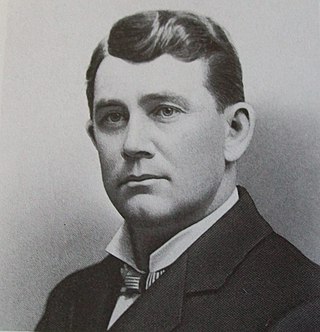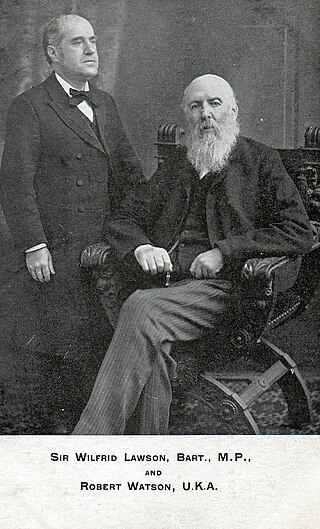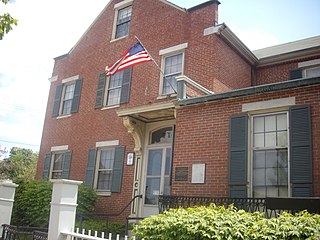
The Maine Law (or "Maine Liquor Law"), passed on June 2, 1851 [1] in Maine, was the first [2] statutory implementation of the developing temperance movement in the United States.

The Maine Law (or "Maine Liquor Law"), passed on June 2, 1851 [1] in Maine, was the first [2] statutory implementation of the developing temperance movement in the United States.
Temperance activist Neal Dow helped craft the Maine liquor law while he was mayor of Portland, Maine. The law's wording included that the sale of all alcoholic beverages except for "medicinal, mechanical or manufacturing purposes" was prohibited. Word of the law's passage quickly spread elsewhere in the nation, and by 1855 twelve states had joined Maine in total prohibition. Known as "dry" states, these states were the opposite of "wet" states, where no prohibition laws existed. [3]
The act was unpopular with many working-class people and immigrants. Opposition to the law turned violent in Portland on June 2, 1855, during an incident known as the Portland Rum Riot. [4] Opponents of the Maine Law stormed Portland City Hall because they thought Mayor Dow was keeping liquor in the basement. [4] Newspapers reported that Dow ordered rioters to be fired upon, killing one and wounding seven. [4] The riot was a contributing factor to the law being repealed in 1856. [3] However, despite repeal, prohibition was re-enacted in various forms and eventually was written into the state constitution in 1885. [4]
The Maine Law gained recognition internationally and was the inspiration for United Kingdom Alliance in Manchester, England. That organization grew and during the late 19th century a street in Manchester, England, was renamed Maine Road in honour of the law. Originally known as Dog Kennel Lane, the street was renamed due to the influence of the temperance movement in the United Kingdom. [5] A 16.5 acre brickworks on the street was later redeveloped into Maine Road football stadium, where Manchester City F.C. played home games between 1923 and 2003. [6]

Prohibition is the act or practice of forbidding something by law; more particularly the term refers to the banning of the manufacture, storage, transportation, sale, possession, and consumption of alcoholic beverages. The word is also used to refer to a period of time during which such bans are enforced.

The Eighteenth Amendment to the United States Constitution established the prohibition of alcohol in the United States. The amendment was proposed by Congress on December 18, 1917, and ratified by the requisite number of states on January 16, 1919. The Eighteenth Amendment was repealed by the Twenty-first Amendment on December 5, 1933—it is the only constitutional amendment in American history to be repealed.

The Twenty-first Amendment to the United States Constitution repealed the Eighteenth Amendment to the United States Constitution, which had mandated nationwide prohibition on alcohol. The Twenty-first Amendment was proposed by the 72nd Congress on February 20, 1933, and was ratified by the requisite number of states on December 5, 1933. It is unique among the 27 amendments of the U.S. Constitution for being the only one to repeal a prior amendment, as well as being the only amendment to have been ratified by state ratifying conventions.

Neal Dow was an American Prohibition advocate and politician. Nicknamed the "Napoleon of Temperance" and the "Father of Prohibition", Dow was born to a Quaker family in Portland, Maine. From a young age, he believed alcohol to be the cause of many of society's problems and wanted to ban it through legislation. In 1850, Dow was elected president of the Maine Temperance Union, and the next year he was elected mayor of Portland. Soon after, largely due to Dow's efforts, the state legislature banned the sale and production of alcohol in what became known as the Maine law. Serving twice as mayor of Portland, Dow enforced the law with vigor and called for increasingly harsh penalties for violators. In 1855, his opponents rioted and he ordered the state militia to fire on the crowd. One man was killed and several wounded, and when public reaction to the violence turned against Dow, he chose not to seek reelection.

James Franklin Hanly was an American politician who served as a congressman from Indiana from 1895 until 1897, and was the 26th governor of Indiana from 1905 to 1909. He was the founder of Hanly's Flying Squadron, which advocated prohibition nationally and played an important role in arousing public support for prohibition.

The Portland Rum Riot, also called the Maine Law Riot, and the June Riot by Neal Dow, was a brief but violent period of civil unrest that occurred in Portland, Maine on June 2, 1855, in response to the Maine law which prohibited the sale and manufacture of alcohol in the state from 1851.

Ontario (AG) v Canada (AG), also known as the Local Prohibition Case, is a significant Canadian constitutional decision by the Judicial Committee of the Privy Council, at that time the highest court in the British Empire, including Canada. It was one of the first cases to enunciate core principles of the federal peace, order and good government power.

The Canada Temperance Act, also known as the Scott Act, was an Act of the Parliament of Canada passed in 1878, which provided for a national framework for municipalities to opt in by plebiscite to a scheme of prohibition. It was repealed in 1984.

Edward Fox was a United States district judge of the United States District Court for the District of Maine.

The United Kingdom Alliance (UKA) was a temperance movement in the United Kingdom founded in 1853 in Manchester to work for the prohibition of the trade in alcohol in the United Kingdom. This occurred in a context of support for the type of law passed by General Neal Dow in Maine, United States, in 1851, prohibiting the sale of intoxicants.

Prohibition in Canada was a ban on alcoholic beverages that arose in various stages, from local municipal bans in the late 19th century, to provincial bans in the early 20th century, and national prohibition from 1918 to 1920. The relatively large and powerful beer and alcohol manufacturing sector, and the huge working class that purchased their products, failed to convince any of the governments to reverse their stance on prohibition. Most provinces repealed their bans in the 1920s, though alcohol was illegal in Prince Edward Island from 1901 to 1948. By comparison, Ontario's temperance act was in effect from 1916 to 1927.

The alcohol laws of Kansas are among the strictest in the United States, in sharp contrast to its neighboring state of Missouri, and similar to its other neighboring state of Oklahoma. Legislation is enforced by the Kansas Division of Alcoholic Beverage Control.

The Neal Dow House, also known as Gen. Neal Dow House, is an historic house found at 714 Congress Street in Portland, Maine. It was built in 1829 for noted politician and prohibitionist Neal Dow (1804-1897), and was later designated a National Historic Landmark for that association. Dow was the author of the first prohibition law passed by the Maine legislature in 1851. He was known as a tireless, internationally known activist for the temperance movement. Dow's house was a center of activism in his lifetime, and is now the headquarters of the Maine chapter of the Women's Christian Temperance Union.
44 Liquormart, Inc. v. Rhode Island, 517 U.S. 484 (1996), was a United States Supreme Court case in which the Court held that a complete ban on the advertising of alcohol prices was unconstitutional under the First Amendment, and that the Twenty-first Amendment, empowering the states to regulate alcohol, did not lessen other constitutional restraints of state power.

The Prohibition era was the period from 1920 to 1933 when the United States prohibited the production, importation, transportation and sale of alcoholic beverages. The alcohol industry was curtailed by a succession of state legislatures, and finally ended nationwide under the Eighteenth Amendment to the United States Constitution, ratified on January 16, 1919. Prohibition ended with the ratification of the Twenty-first Amendment, which repealed the Eighteenth Amendment on December 5, 1933.

Alcohol is prohibited in the states of Bihar, Gujarat, Mizoram, and Nagaland. All other Indian states and union territories permit the sale of alcohol.
A dry state was a state in the United States in which the manufacture, distribution, importation, and sale of alcoholic beverages was prohibited or tightly restricted. Some states, such as North Dakota, entered the United States as dry states, and others went dry after the passage of prohibition legislation or the Volstead Act. No state remains completely dry, but some states do contain dry counties.

In the United States, the temperance movement, which sought to curb the consumption of alcohol, had a large influence on American politics and American society in the nineteenth and twentieth centuries, culminating in the prohibition of alcohol, through the Eighteenth Amendment to the United States Constitution, from 1920 to 1933. Today, there are organizations that continue to promote the cause of temperance.

Brigadier General James Appleton was an American abolitionist, early supporter of temperance, and politician from Maine.

The Dominion Alliance for the Total Suppression of the Liquor Traffic was an organization established in 1877 in Canada that lobbied for prohibition of alcohol. Membership was largely Protestant and Anglophone. The Dominion Alliance faced passive resistance from politicians concerned about the views of their constituents, particularly in Quebec, but had some success at the local level. Sale of alcohol was prohibited provincially and then nationally during World War I (1914–18). After the war the national and provincial temperance laws were repealed and the Dominion Alliance faded into irrelevance.